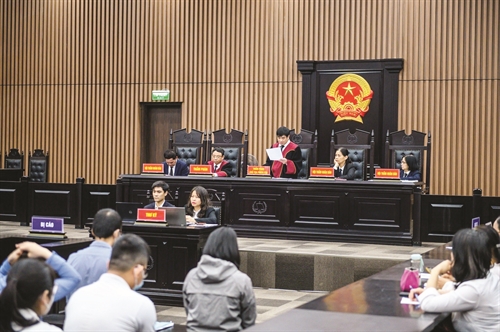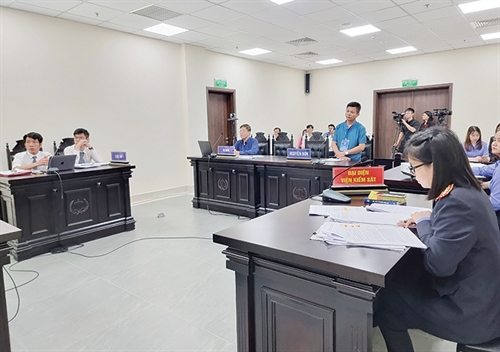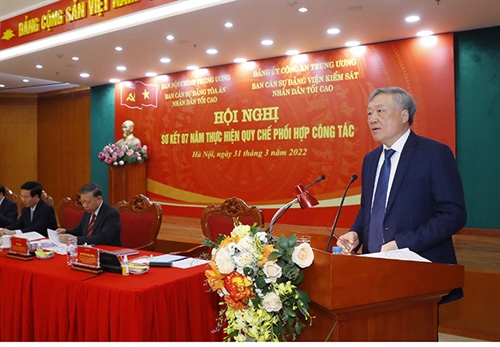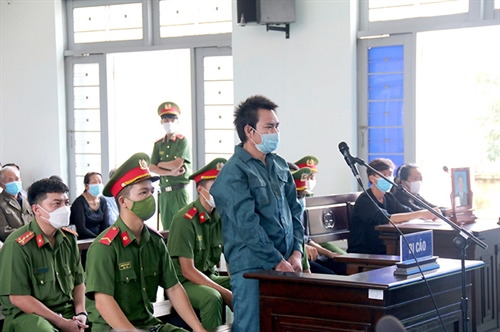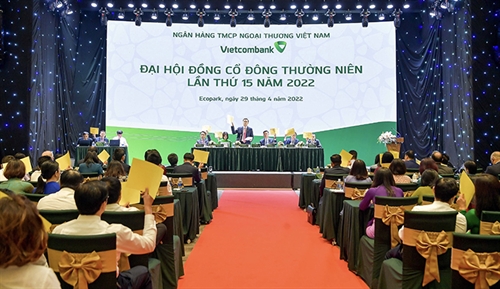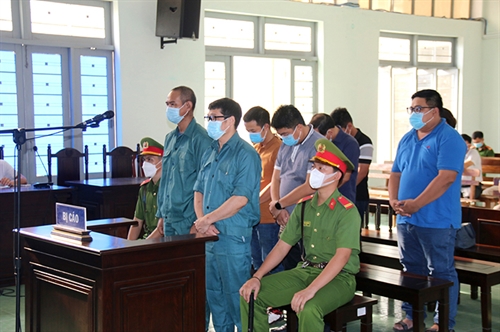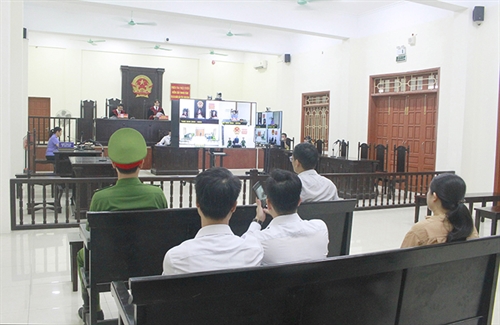Assoc. Prof. Dr. Le Huynh Tan Duy Ho Chi Minh City University of Law
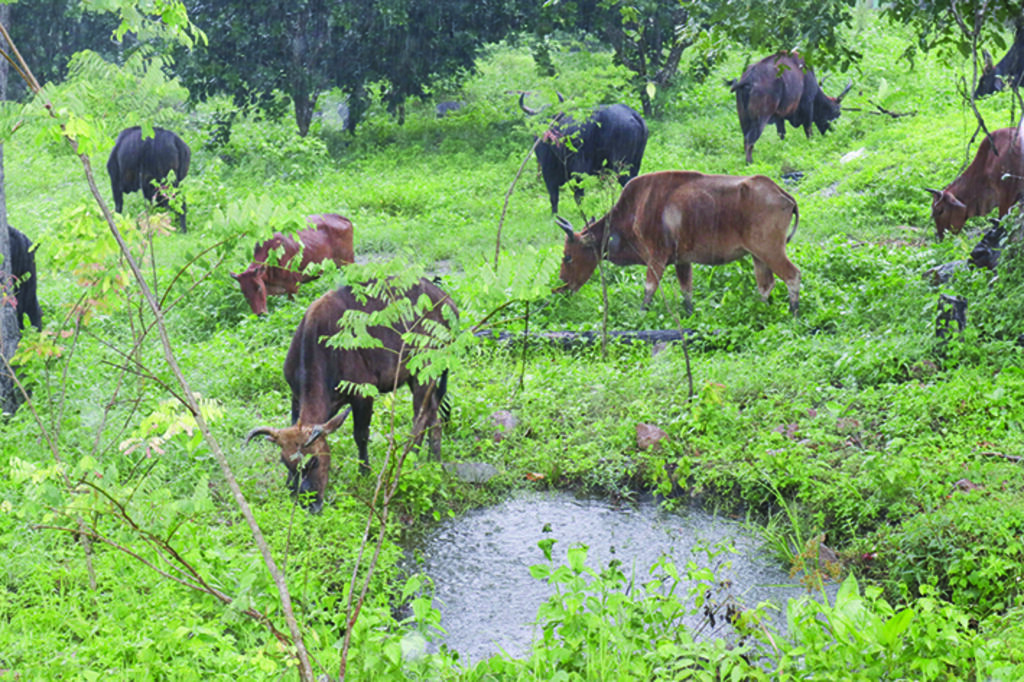 |
| A herd of hybrid gayals in Phuoc Binh National Park, Ninh Thuan province__Photo: Nguyen Thanh/VNA |
Illegal wildlife trade and trafficking in maritime transport usually constitute transnational organized crimes that cause extremely serious harms to the society and the survival of many endangered wildlife species. Despite its great efforts exerted over the past years, Vietnam has yet to effectively prevent and handle acts of illegally trading and trafficking wildlife in maritime transport which are mainly from the African countries. Meanwhile, the national use of international guidelines and indicators as an assessment basis has shown certain limitations in the country’s criminal legislation on prevention and combat of illegal wildlife trade and trafficking in maritime transport. This article gives an insight into the situation and makes recommendations for improving the legal framework concerning this field.
International law, guidelines and indicators concerning prevention and combat of illegal wildlife trade and trafficking in maritime transport
International law against wildlife crimes
There is so far no international legal instrument enacted to prevent and combat crimes against wildlife in general. Nevertheless, some international conventions do contain provisions directly or indirectly regulating the international trade in wildlife and incriminating wildlife-related illegal acts. Though providing no specific guidelines and indicators to help evaluate legal frameworks on wildlife crimes of member states, these instruments have set out orientations and obligations for these member states to reform their legal systems and improve the law enforcement effectiveness as well as mechanisms for international cooperation in crime prevention and combat. Becoming a member state of the international conventions mentioned below itself serves as a criterion for evaluating anti-crime efforts of a country:
· The 1973 Convention on International Trade in Endangered Species of Wild Fauna and Flora (CITES), which is the international instrument controlling and regulating international trade in protected species to ensure that the trade in wildlife specimens does not threaten their survival. More significantly, the CITES is the only convention that requires member states to penalize acts of illegally trading in protected species;
· The United Nations Convention against Transnational Organized Crime (CTOC), which is an important and virtually global instrument on prevention and combat of organized crimes, including illegal trade of wild fauna and flora and their products;
· The United Nations Convention against Corruption (CAC), which is also an important instrument in this field[1] since wildlife crimes are in reality connected with corruption acts.
In addition to the above three conventions, some other conventions also help establish principles and mechanisms for mitigating wildlife crimes, including the Convention on Biological Diversity and the Convention Concerning the Protection of the World Cultural and Natural Heritage.
International guidelines and indicators concerning prevention and combat of wildlife crimes
In 2012, the United Nations Office on Drugs and Crime (UNODC) introduced the Wildlife and Forest Crime Analytic Toolkit (also known as the International Consortium on Combating Wildlife Crime - ICCWC Toolkit), aiming to provide comprehensive guidelines for the analysis of administrative, preventive and criminal responses to crimes against wild fauna and flora as well as other related crimes in a specific state. The toolkit may be used in tandem with the Indicator Framework for Combating Wildlife and Forest Crime: A Self-Assessment Framework for National Use (Assessment Guidelines) introduced in 2016[2].
Particularly, on June 1, 2022, the International Maritime Organization (IMO) issued the Guidelines for the Prevention and Suppression of the Smuggling of Wildlife on Ships Engaged in International Maritime Traffic, providing basic procedures related to the detection, investigation and prosecution of illegal wildlife smuggling activities in maritime transport and make prevention the principal means of ensuring that smuggling of wildlife does not damage the world’s economy and well-being.
The above toolkits may be used in combination as a system of guidelines and indicators to enable countries to comprehensively and properly assess their legal frameworks and the enforcement of their laws on prevention and combat of wildlife crimes in general and acts of illegally trading and trafficking in wildlife in maritime transport in particular and, on that basis, to devise solutions to improve their legal frameworks and effectiveness of the prevention and handling of these crimes.
Vietnam’s criminal legislation on prevention and combat of illegal wildlife trade and trafficking in maritime transport
In Vietnam, the legal framework on prevention and handling of acts of illegally trading and trafficking in wildlife in maritime transport constitutes part of the general legal framework on prevention and combat of wildlife crimes, and mainly focuses on the handling of crimes.
The criminal law’s provisions on handling of acts of illegally trading and trafficking in wildlife in maritime transport
The 2015 Penal Code (revised in 2017) (the Code) prescribes two crimes against wildlife, namely: “Violating regulations on wildlife management and protection” and “Violating regulations on protection of endangered, precious and rare animals”[3]. The first one is classified as a crime infringing upon the economic management order while the second one is an environmental crime. Those who violate regulations on protection of animals on the List of endangered, precious and rare species prioritized for protection or on the List of endangered, precious and rare forest plants and forest animals of Group IB or in Annex I to the CITES would be handled under Article 244 of the Code, while violators of regulations on protection of animals on the List of endangered, precious and rare forest plants and forest animals of Group IIB or in Annex II to the CITES or other wildlife species would be criminally charged under Article 234 of the Code[4].
The criminal procedure law’s and specialized laws’ provisions on settlement of criminal cases involving acts of illegally trading and trafficking in wildlife in maritime transport
Vietnam’s criminal procedure law has no specific provisions on the order and procedures for settlement of criminal cases involving wildlife crimes in general and acts of illegally trading and trafficking in wildlife in maritime transport in particular. As a result, in principle, the settlement of criminal cases involving these crimes is carried out according to common criminal procedures.
Due to special characteristics of acts of illegally trading and trafficking in wildlife in maritime transport, the success of settlement of criminal cases involving these acts largely depends on the detection, receipt and processing of information about such acts[5] obtained through inspection and control activities of the customs and coast guard forces in Vietnam’s maritime zones, in addition to the stages of criminal case initiation and investigation.
The investigation of these acts involves not only the investigating activities specified by the criminal procedure law but also international cooperation activities based on multilateral and bilateral treaties concerning mutual legal assistance in criminal matters.
Evaluation of Vietnam’s criminal legislation on prevention and combat of acts of illegally trading and trafficking in wildlife in maritime transport
By using the ICCWC and IMO guidelines and indicators as a measure for evaluation of domestic laws, particularly the criminal legislation on prevention and combat of acts of illegally trading and trafficking in wildlife in maritime transport, the following pluses and minuses are revealed.
Pluses
As a CITES member state, Vietnam has exerted enormous efforts to translate the CITES provisions into domestic laws. For example, the Code adds the new crime of violating regulations on wildlife management and protection and provides more specifically constituents of the crime of violating regulations on protection of endangered, precious and rare animals which evolves from the crime provided in Article 190 of the 1999 Penal Code and is based on relevant CITES provisions. The Supreme People’s Court’s Judicial Council also issued in 2018 Resolution 05 guiding in detail the imposition of these crimes in order to serve the practical prevention and combat of crimes against endangered, precious and rare wild animals.
The Code also provides for crimes related to the illegal wildlife trade and trafficking, such as money laundering (Article 324), corruption-related crimes defined in Articles 353 thru 359, and forging seals and documents of agencies or organizations, or using forged seals and documents of agencies or organizations (Article 341).
The Ministry of Agriculture and Rural Development is assigned to act as the national focal point for implementation of the CITES. As a member state of the CTOC and CAC as well as the Convention on Biological Diversity and the Convention Concerning the Protection of the World Cultural and Natural Heritage, Vietnam is obliged to revise and reform its national legal framework to be consistent with the provisions of these Conventions. In fact, this is one of the ICCWC requirements that the country has somehow satisfied.
Minuses
In the spirit of the ICCWC and IMO guidelines and indicators and related studies, Vietnam’s laws seem to focus more on handling than prevention and control of acts of illegally trading and trafficking in wildlife in maritime transport.
First, Article 244 of the Code[6] seems to be unreasonable, especially when compared to Article 234 of the Code[7], to incriminate acts of illegally stockpiling, transporting or trading in individuals or parts inseparable from living bodies (for example: tiger fangs, bear paws, etc.) or products of the animal species on the List of endangered, precious and rare specified prioritized for protection (Clause 1.b)regardless of the quantity thereof, or to specify no minimum quantity thereof as a ground for examination of penal liability of violators. Besides, Clauses 2 thru 5 do not specify cases involving products of the animal species on the above-said List, making it impossible to exactly determine penal liability of violators.
Second, regarding the procedures for settling criminal cases involving wildlife crimes in general and acts of illegally trading and trafficking wildlife in maritime transport in particular, Vietnam’s criminal procedure law still shows limitations that might cause difficulties or confusions for law enforcement bodies and lacks separate documents providing guidance on the competence to initiate and investigate criminal cases, carry out expert assessment, valuation and handling of exhibits being wild animals and products thereof.
Specifically, the 2015 Law on Organization of Criminal Investigation Bodies empowers the forest ranger and fisheries surveillance forces, but not the customs and coast guard forces, to initiate and investigate criminal cases against the crime of violating regulations on protection of endangered, precious and rare animals. This is unreasonable since the customs and coast guard forces have every chance to detect acts of illegally trading and trafficking wildlife in maritime transport (see footnote 5 above to know why). The fact that these forces are not assigned to initiate and investigate criminal cases might cause difficulties to the collection of evidence for proving crimes and criminals, thus lowering the effectiveness of crime prevention and combat.
Recommendations on improvement of the criminal legislation on wildlife crimes
Firstly, Vietnam’s legal system for wildlife protection should be revised according to the orientations set in the ICCWC Toolkit toward simplicity and effectiveness of domestic regulations, attaching more importance to the prevention of violations of regulations on wildlife protection and enhancing the management of natural resources, industrial restructuring, rural development services and poverty alleviation for communities whose livelihood is based on wild fauna and flora.
Secondly, it is proposed to move the crime defined in Article 234 of the Code to Chapter XIX (Environmental crimes) right below the crime mentioned in Article 244 of the Code. It is also necessary to set a lower minimum value of wildlife harmed by this crime for examination of penal liability and consider administrative sanctioning of acts of violating regulations on wildlife protection involving the value of wildlife below this minimum level under Government Decree 35/2019/ND-CP dated April 25, 2019.
Thirdly, Article 244 of the Code needs to be revised by (i) adding a provision (in Clause 1.b) on the minimum quantity of wildlife products involved in the crime for examination of penal liability and specifying different quantities of wildlife and wildlife products for use as a basis for deciding on penalties (in Clauses 2 thru 5), and (ii) adding a provision on the minimum aggregate quantity of wildlife of different classes for use as a ground for examination of penal liability.
Fourthly, the Supreme People’s Court should adopt a resolution to guide proceeding-conducting bodies in proving of the mental fault (the subjective element of crime) of offenders in committing the wildlife crimes. Regarding this matter, Vietnam’s proceeding-conducting bodies may consider allowing prosecutors to use circumstantial evidences in the process of accusing offenders.
Fifthly, it is suggested to amend Articles 33.1 and 35.1 of the 2015 Law on Organization of Criminal Investigation Bodies toward empowering the customs and coast guard forces to initiate and investigate criminal cases against the wildlife crimes, especially when they involve acts of illegally trading and trafficking wildlife in maritime transport.
Sixthly, Article 224.2 of the Criminal Procedure Code should be supplemented to allow the application of special procedural investigation measures against transnational organized crimes in order to facilitate the detection and handling of acts of illegally trading and trafficking wildlife in maritime transport.
Lastly, it is proposed that Vietnam intensify negotiation and conclusion of bilateral agreements on mutual legal assistance in criminal matters with the African countries so as to provide legal grounds for carrying out coordination activities to promptly and thoroughly settle criminal cases involving acts of illegally trading and trafficking wildlife from those countries to Vietnam.-
[1] This Convention provides a system of anti-corruption measures and related measures to criminalize corruptive acts, enforce anti-corruption laws, facilitate anti-corruption international cooperation, seize corruption-related property, provide technical assistance and exchange information.
[2] The ICCWC Toolkit comprises five parts: legislation; enforcement; judiciary and prosecution; drivers and prevention; and data and analysis. The Indicator Framework comprises three parts: (i) Introduction of 50 indicators arranged against eight groups of desired enforcement outcomes; (ii) Practical guidance on completing an assessment using the Indicator Framework; and (iii) Discussion of the analysis of results.
[3] Articles 234 and 244 of the Code.
[4] The Government and the Supreme People’s Court’s Judicial Council have issued many documents to guide the application of these articles.
[5] According to statistics, though 90 percent of the global trade flow is seaborne, less than 2 percent of shipped containers are inspected by the customs. In other words, the control of wildlife crimes is largely based on intelligence data or suspicious signs detected through the customs office’s risk management activities. The 2014 Customs Law provides professional measures applicable by customs offices for customs control and inspection and risk management in order to prevent and combat smuggling and illegal cross-border transportation of goods and other violations of the customs law. Article 9 of the 2018 Law on Coast Guard also vests the Coast Guard Force with the power to patrol, inspect and control people, ships, cargoes and luggage in Vietnam’s maritime zones.
[6] The crime of violating regulations on management and protection of endangered, precious and rare animals.
[7] The crime of violating regulations on wildlife management and protection.
